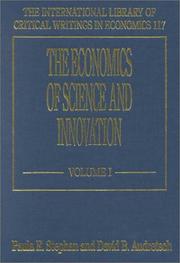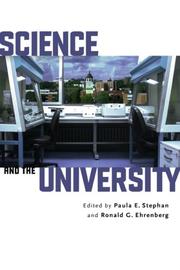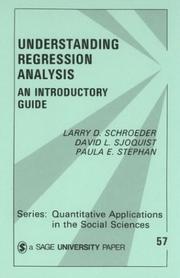| Listing 1 - 10 of 22 | << page >> |
Sort by
|
Book
ISBN: 9780674049710 0674049713 0674062752 9780674062757 Year: 2012 Publisher: Cambridge, Mass. Harvard University Press
Abstract | Keywords | Export | Availability | Bookmark
 Loading...
Loading...Choose an application
- Reference Manager
- EndNote
- RefWorks (Direct export to RefWorks)
The beauty of science may be pure and eternal, but the practice of science costs money. And scientists, being human, respond to incentives and costs, in money and glory. Choosing a research topic, deciding what papers to write and where to publish them, sticking with a familiar area or going into something new-the payoff may be tenure or a job at a highly ranked university or a prestigious award or a bump in salary. The risk may be not getting any of that.At a time when science is seen as an engine of economic growth, Paula Stephan brings a keen understanding of the ongoing cost-benefit calculations made by individuals and institutions as they compete for resources and reputation. She shows how universities offload risks by increasing the percentage of non-tenure-track faculty, requiring tenured faculty to pay salaries from outside grants, and staffing labs with foreign workers on temporary visas. With funding tight, investigators pursue safe projects rather than less fundable ones with uncertain but potentially path-breaking outcomes. Career prospects in science are increasingly dismal for the young because of ever-lengthening apprenticeships, scarcity of permanent academic positions, and the difficulty of getting funded.Vivid, thorough, and bold, How Economics Shapes Science highlights the growing gap between the haves and have-nots-especially the vast imbalance between the biomedical sciences and physics/engineering-and offers a persuasive vision of a more productive, more creative research system that would lead and benefit the world.
Science policy --- Sociology of knowledge --- Research --- Science and state. --- Recherche --- Politique scientifique et technique --- Economic aspects. --- Aspect économique --- AA / International- internationaal --- 476 --- 338.6 --- 50 --- education --- enseignement --- recherche et developpement --- Science --- State and science --- State, The --- Economie van de opvoeding. --- Wetenschappelijk onderzoek en ontwikkeling. --- Algemeenheden. Geschiedenis en filosofie van de wetenschappen. --- opvoeding --- onderwijs --- onderzoek en ontwikkeling --- Government policy --- Aspect économique --- Science and state --- Economic aspects --- Wetenschappelijk onderzoek en ontwikkeling --- Economie van de opvoeding --- Algemeenheden. Geschiedenis en filosofie van de wetenschappen
Book
Year: 2013 Publisher: Cambridge, Mass. : National Bureau of Economic Research,
Abstract | Keywords | Export | Availability | Bookmark
 Loading...
Loading...Choose an application
- Reference Manager
- EndNote
- RefWorks (Direct export to RefWorks)
Federal aid to research. --- Federal aid to research --- Sex differences.
Book
Abstract | Keywords | Export | Availability | Bookmark
 Loading...
Loading...Choose an application
- Reference Manager
- EndNote
- RefWorks (Direct export to RefWorks)
FEMMES --- BENEVOLAT --- STATISTIQUE --- CREATION EMPLOIS --- FEMMES --- BENEVOLAT --- STATISTIQUE --- CREATION EMPLOIS
Digital
Year: 2010 Publisher: Cambridge, Mass. National Bureau of Economic Research
Abstract | Keywords | Export | Availability | Bookmark
 Loading...
Loading...Choose an application
- Reference Manager
- EndNote
- RefWorks (Direct export to RefWorks)
Some scholars view academic and industrial science as qualitatively different knowledge production regimes. Others claim that the two sectors are increasingly similar. Large-scale empirical evidence regarding similarities and differences, however, has been missing. Drawing on prior work on the organization of science, we first develop a framework to compare and contrast the two sectors along four key dimensions: (1) the nature of research (e.g., basic versus applied); (2) organizational characteristics (e.g., degree of independence, pay); (3) researchers' preferences (e.g., taste for independence); and (4) the use of alternative disclosure mechanisms (e.g., patenting and publishing). We then compare the two sectors empirically using detailed survey data from a representative sample of over 5,000 life scientists and physical scientists employed in a wide range of academic institutions and private firms. Building on prior work that has emphasized different “research missions”, we also examine how the nature of research is related to other characteristics of science within and across the two sectors. Our results paint a complex picture of academic and industrial science. While we find significant industry-academia differences with respect to all four dimensions, we also observe remarkable similarities. For example, both academic institutions and private firms appear to allow their scientists to stay actively involved in the broader scientific community and provide them with considerable levels of independence in their jobs. Second, we find significant differences not just between industrial and academic science but also within each of the two sectors as well as across fields. Finally, while the nature of research is a significant predictor of other dimensions such as the use of patenting and publishing, it does not fully explain the observed industry-academia differences in those dimensions. Overall, our results suggest that stereotypical views of industrial and academic science may be misleading and that future work may benefit from a richer and more nuanced description of the organization of science.

ISBN: 1858987555 Year: 2000 Volume: 117 Publisher: Northampton, MA : E. Elgar Pub.,
Abstract | Keywords | Export | Availability | Bookmark
 Loading...
Loading...Choose an application
- Reference Manager
- EndNote
- RefWorks (Direct export to RefWorks)
Economic analysis of law --- Technological innovations --- Research --- Science --- Innovations --- Recherche --- Sciences --- Economic aspects. --- Aspect économique --- Aspect économique
Book
ISBN: 0195064054 Year: 1992 Publisher: Oxford Oxford university press
Abstract | Keywords | Export | Availability | Bookmark
 Loading...
Loading...Choose an application
- Reference Manager
- EndNote
- RefWorks (Direct export to RefWorks)
Science policy --- United States --- Ability [Influence of age on ] --- Age and ability --- Age factors in ability --- Aptitude [Influence de l'âge sur l'] --- Bekwaamheid [Invloed van ouderdom op ] --- 001.89 --- Organisatie van wetenschap en wetenschappelijk werk. Wetenschapsbeleid --- 001.89 Organisatie van wetenschap en wetenschappelijk werk. Wetenschapsbeleid --- Ability, Influence of age on --- Creative ability in science --- Scientists --- Scientific creativity --- Science --- Mind and body --- Age and employment --- Methodology --- Scientists - United States. --- Creative ability in science - United States. --- Ability, Influence of age on. --- United States of America

ISBN: 1282255975 9786612255977 029922483X 9780299224837 9780299224806 0299224805 9781282255975 6612255978 Year: 2007 Publisher: Madison, Wis. University of Wisconsin Press
Abstract | Keywords | Export | Availability | Bookmark
 Loading...
Loading...Choose an application
- Reference Manager
- EndNote
- RefWorks (Direct export to RefWorks)
Universities and colleges --- Science students --- Graduate students in science --- Research --- Science --- Students --- Graduate students --- Finance. --- Study and teaching (Higher)
Book
Year: 1998 Publisher: London Centre For Economic Policy Research. Discussion Paper Nr. 1991 - Industrial Organization
Abstract | Keywords | Export | Availability | Bookmark
 Loading...
Loading...Choose an application
- Reference Manager
- EndNote
- RefWorks (Direct export to RefWorks)
Book
ISBN: 9781506332888 1506332889 1544365349 1506361625 1506361609 1506361617 Year: 2017 Volume: 57 Publisher: Los Angeles (Calif.): Sage,
Abstract | Keywords | Export | Availability | Bookmark
 Loading...
Loading...Choose an application
- Reference Manager
- EndNote
- RefWorks (Direct export to RefWorks)
The second edition of Understanding Regression Analysis: An Introductory Guide presents the fundamentals of regression analysis, from its meaning to uses, in a concise, easy-to-read, and non-technical style. From back cover.
Mathematical statistics --- #SBIB:303H520 --- Regression analysis. --- Analysis, Regression --- Linear regression --- Regression modeling --- Methoden sociale wetenschappen: techniek van de analyse, algemeen --- Multivariate analysis --- Structural equation modeling --- Regression Analysis. --- Regression analysis

ISBN: 0803927584 1412986419 1483303756 0585217211 9780803927582 Year: 1986 Volume: 07-057 Publisher: Newbury Park (Calif.): Sage,
Abstract | Keywords | Export | Availability | Bookmark
 Loading...
Loading...Choose an application
- Reference Manager
- EndNote
- RefWorks (Direct export to RefWorks)
Social sciences --- -Behavioral sciences --- Human sciences --- Sciences, Social --- Social science --- Social studies --- Statistical methods --- Regression analysis. --- Statistical methods. --- Regression analysis --- #PBIB:2001.1 --- #SBIB:004.IO --- #SBIB:303H10 --- #SBIB:303H523 --- 303.724 --- Analysis, Regression --- Linear regression --- Regression modeling --- Multivariate analysis --- Structural equation modeling --- 303.724 Causale analyse. Variantieanalyse. Regressieanalyse --(sociaal onderzoek) --- Causale analyse. Variantieanalyse. Regressieanalyse --(sociaal onderzoek) --- Methoden en technieken: algemene handboeken en reeksen --- Methoden sociale wetenschappen: associatie, correlatie --- Mathematical statistics --- Regression Analysis --- Analyse de régression --- Sciences sociales --- Méthodes statistiques --- Social sciences - Statistical methods
| Listing 1 - 10 of 22 | << page >> |
Sort by
|

 Search
Search Feedback
Feedback About UniCat
About UniCat  Help
Help News
News